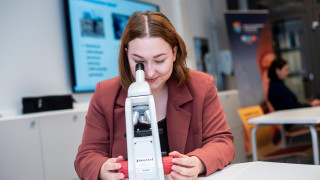I help companies invest in AI solutions to strengthen their competitiveness

The series Research in the Spotlight allows researchers from Kokkola University Consortium Chydenius to discuss their current research activities.
Jari Luomala works as a project researcher at the Information Technology Unit of Kokkola University Consortium Chydenius.
What are you trying to solve with your research?
Currently, I am conducting research on the potential of artificial intelligence (AI) solutions to address the needs of the manufacturing industry. A large amount of data on manufacturing processes is produced and collected using various sensors. In addition, regular laboratory measurements and analyses are carried out to assess the functionality and quality of industrial processes. However, the real-time data produced by sensors is often not utilised in the most effective way, while less frequent laboratory measurements consume both time and resources. The automation of quality control in industrial processes would enable quicker responses and process adjustments to ensure product quality, and it could also be used alongside traditional laboratory testing.
How does the research answer these questions?
The research explores and pilots AI solutions for quality control and anomaly detection in industrial processes within the manufacturing industry. The main goal is to develop AI-based soft sensors that combine and process data measured from different process variables to generate new useful information. In practice, this involves applying various machine learning methods and developing models designed to predict indicators of process state or product quality, such as laboratory sample values based on physical sensor data. This enables a cost-effective, real-time assessment of an indicator or a metric that reflects the state of the process and/or product quality, which cannot be measured directly.
What do the results of the research specifically concern – and in what way?
The results of the research are particularly relevant to industrial companies, which can apply AI to support their operations, for example, by enhancing quality control in production processes. The project’s piloting efforts and technology transfer will predominantly focus on companies in the region, but the developed AI solutions and the experience gained with their effectiveness and potential in managing industrial processes can be applied more broadly across the industry. This knowledge can later be used by companies, for example, to support their own investment decisions.
What is the significance of the research results economically, socially, or politically?
The research results will help companies invest in AI solutions and thus improve their competitiveness, for example, through enhanced product quality and increased productivity. The use of AI in the development of production processes contributes to a more efficient and better use of materials and resources, which in turn supports sustainable development. The aim is to raise awareness of the potential of AI solutions, which is expected to increase interest and willingness to invest in them. In addition, the knowledge gained through the research can be used in education, research, and future development projects.





